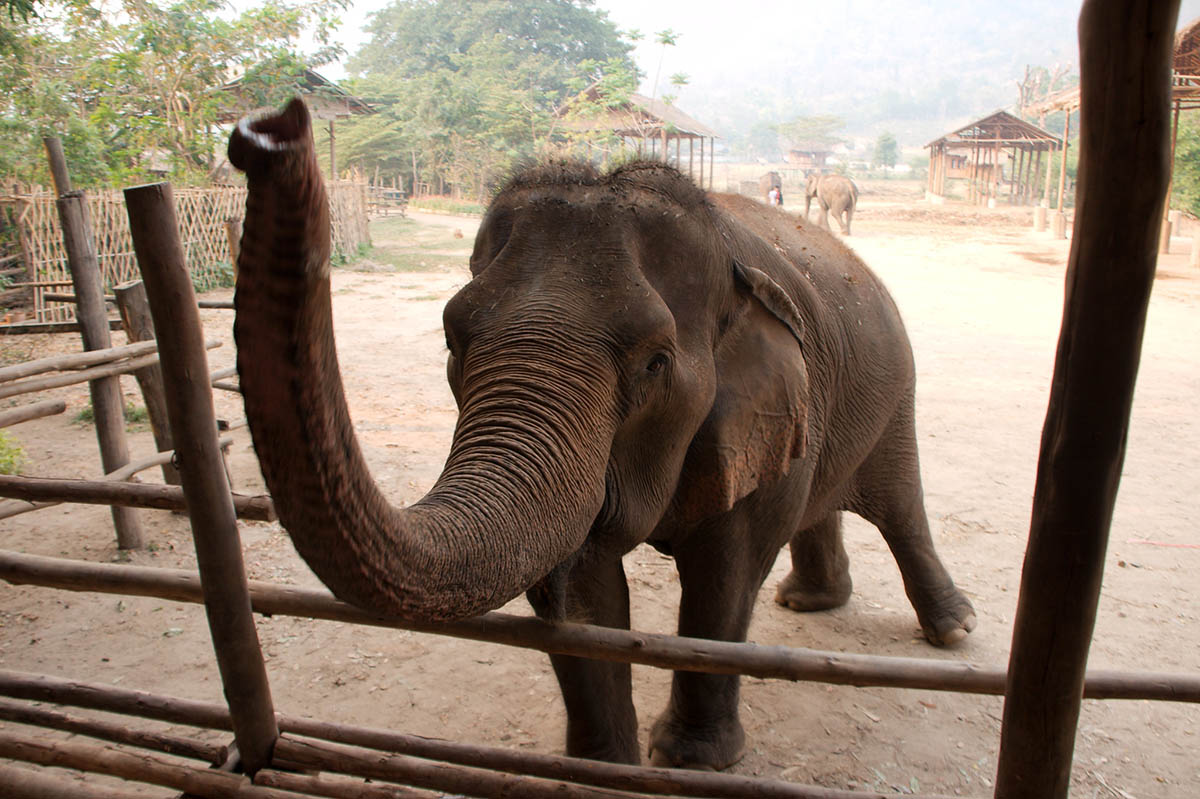Top: File photo of an elephant at Elephant Nature Park in Chiang Mai. Photo: Christian Haugen
Large feet sink into the earth as the elephant lurches forward, straining to pull with its entire body. Taught chains bite into its flesh as it pulls, one difficult step at a time, a timber truck up a jungle mountain road.
It’s difficult to know the contexts of scenes like these appearing on social media, but it raises concern that, deprived of tourists to carry on their backs or cheer as they paint with their trunks, the oft-exploited elephants of Thailand’s tourism industry have been put to even crueler – and possibly illegal – work.
Since Thailand closed its borders to tourists in March 2020, countless elephant camps have closed for lack of revenue, forcing elephant keepers and mahouts to put their animals up for sale or work elsewhere. Some say it’s also forced a reckoning that has opened some elephant owners’ minds to a better way for their animals.
While it’s difficult to draw a direct link between unemployed elephants and the clips of them doing back-breaking logging work, it is known that industry which once depended on their labor is one the owners have turned to when tourists stopped coming.
@bom_1083รถขึ้นไม่รอดต้องเอาช้างลากแล้วหัวเห้อ😆😀😅#วัยรุ่นขนอม🔰🔰🔰🔰🔰🔰🔰🔰 #ขอใจหน่อยคับ🥰😘😁😃♬ แล้วแต่เค้าเราได้เพ ก้อย กินรี – กล้วยหมกลืม เมืองลุง
Just as devastated as the exploitative attractions that harness elephants for rides and “shows” are the ethical sanctuaries which rely on visitors and donations to keep their rescued, endangered animals fed.
“Before the pandemic, we welcomed a daily average of 70 guests,” said Vincent Gerards, general manager of Phuket Elephant Sanctuary, which emphasizes animal welfare and houses rescued and retired elephants. “We’ve had around seven per month since. At some points, none for two or three weeks at a time.”
Wichien “Noi” Sitthisongkram, 55, owner of Panda Elephant Camp in Chiang Mai province, used to sell elephant treks, feeding and bathing sessions to a steady stream of European and Chinese tour groups.
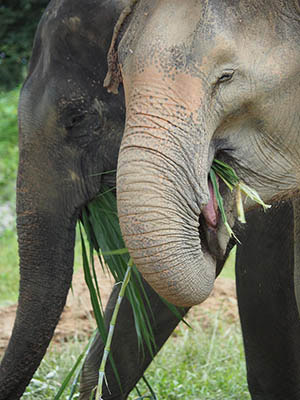
He’s received “zero income” since the pandemic hit and was forced to close the camp and lay off two mahouts. Sitthisongkram’s six elephants are now three – two died of old age, he said, and a third was sold off.
Only one mahout remains to look after those three. “And I still owe him a salary,” he fretted. To cover debts, he has mortgaged his land and put it up for sale.
The cost of feeding, housing and caring for a single pachyderm is substantial. They must be fed a balanced diet of pineapple leaves, fruit, grasses, bamboo and banana trees. That doesn’t include medicines, vet bills and staff wages. And for some camps: land rental. It adds up fast.
“This roughly totals 45,000 baht (US$1,400) per elephant, per month, and we have 12 of them,” said the Phuket sanctuary’s Gerards. “We kept our 70 staff on, but had to cut both their pay and hours. To try to make ends meet, we had to get creative.”
Crowdfeeding
Turning to its tens of thousands of social media followers for help, the Phuket sanctuary didn’t just want to ask for money but instead “designed initiatives people could join from afar,” Gerards said. Attracting sponsors is where the creative part came in.
“We produced two short films, telling the story of two elephants’ daily routines and a mahout’s (elephant keeper’s) role in rescuing another elephant. Supporters can purchase exclusive access; all proceeds feed our herd,” he said.

Supporters can also sponsor feeding the entire herd “rice ball” snacks packed with fruit and vegetables for US$30 per day. In return, they get a video of the “Happy Meals” being prepared and fed to the elephants.
Realizing they needed to be more self-sufficient, the sanctuary asked followers to sponsor a banana tree orchard at US$5 per tree. Last year they planted around 1,200 trees, many bearing their sponsor’s names on wooden tags. (“If the tourists come back, they can find their banana tree!”)
Gerards said the effort paid off for the animals’ welfare.
“The social media following we built up pre-COVID proved beneficial. We raised enough to feed the elephants for a month and a half, although not nearly enough to cover all expenses. We’ve relied on savings to keep going,” he said.
While such measures must sustain them for now, the Phuket sanctuary sees a ray of hope with the sandbox travel scheme that opened in July
“We had no bookings initially and were pessimistic. But suddenly people started coming and we’re getting six or seven bookings per day,” he said, cautioning that a “dark cloud” remained hanging over Thailand.
But if that trend continues, the sanctuary will again earn enough to feed its elephants and begin to recover.
The clouds are certainly dark for elephant tourism outside of Phuket.
Sitthisongkram in Chiang Mai received help from the Save Elephant Foundation, a respected nonprofit dedicated to providing care and assistance for Asian Elephants. Over the past year, they’ve organized deliveries of dry food to elephants, donated money to help pay bills and planted crops to serve as ‘food banks.’
“We’ve helped about 2,000 elephants so far,” said founder Sangdeaun “Lek” Chailert, “But some elephants have been chained up since February 2020.” Camps must submit daily videos of their charges roaming free in exchange for support.
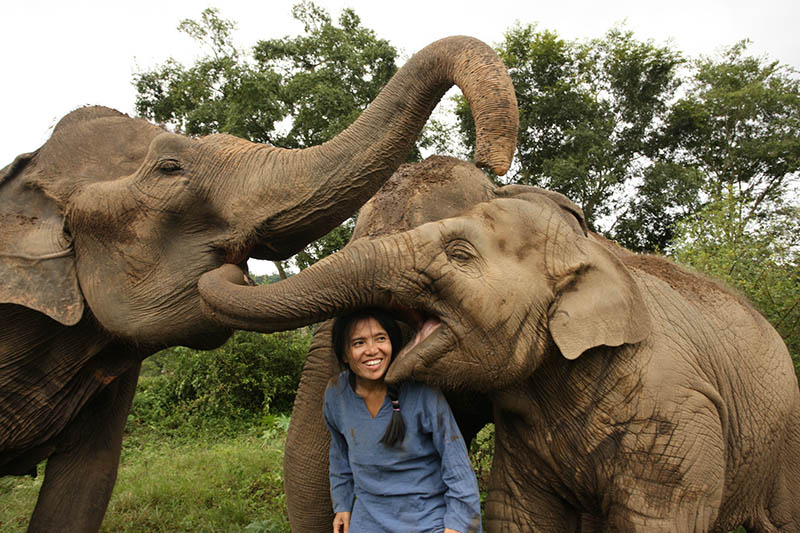
Thailand has approximately 3,800 elephants in some form of captivity, and Chailert reckons about 1,800 have returned to Surin, a key province where they are bred, bought and sold.
The problems don’t end there.
“When they arrive home, both mahouts and elephants face many problems. There’s no income, no food, no job and no idea what to do next,” she said.
“Some have been away for 20 years. They’ve discovered forests, once used for grazing, have become plantations: now unavailable to elephants,” Chailert continued.
She described how eight elephants became mysteriously ill upon their return to communities in Mae Hong Son, the nation’s northwesternmost corner wedged between Chiang Mai and Myanmar. Chailert suspects eating maize stalks (a common crop there) contaminated with pesticides was the cause. Rain also washes chemicals off fields and into rivers, making bathing dangerous for the gentle giants.
Where the public and elephant protectors have stepped up, the government has not.
At the Elephant Nature Park, Chailert’s sanctuary, she said they “received a delivery of dried grass from the Department of Livestock Development: Enough to feed each elephant for just two days!” she complained.
Sitthisongkram said he hasn’t heard from the authorities either.
That’s spurred desperate owners to look for work in the logging industry.
Return to logging
“Around 300 mahouts and their elephants have left Surin again, many returning to logging,” Chailert said. This work is dangerous for elephants. Plus, anything that puts natural forest cover at risk is unacceptable given the climate crisis.
View this post on Instagram
Though Thai law bans the use of elephants to transport wood, they are considered private property under the 1939 Beasts of Burden Act. That gives owners the power to put them to work how they see fit. Though the government banned all natural forest logging in 1989, a lot of protections exist only on paper and logging continues on managed plantations – or even illegally.
It’s hard to determine the legality of elephants returned to logging as cases would have to be evaluated individually.
“The law is unclear, but elephants are definitely doing this work during the pandemic. I’ve visited them myself,” Chailert said.
Sitthisongkram said that while he wasn’t using his elephants for logging, other camps are.
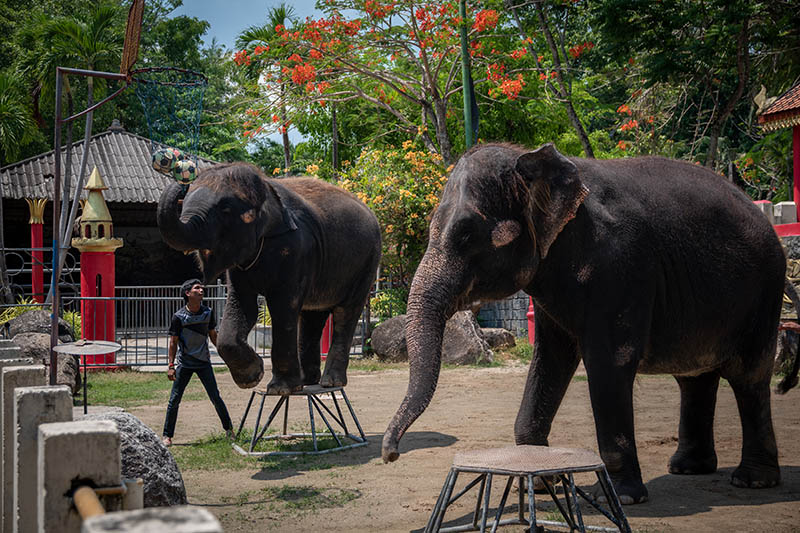
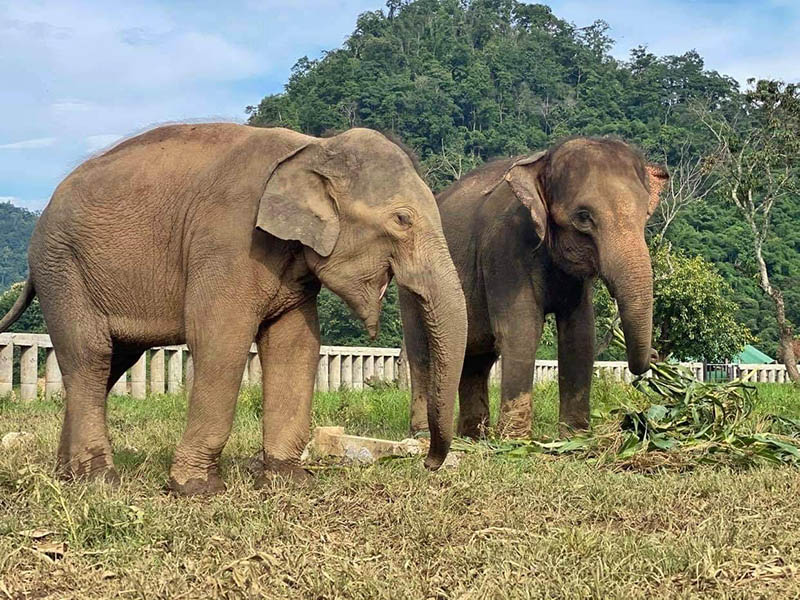
Chailert said she’s reached out to mahouts who’ve taken their elephants across the border into Myanmar for logging. Some made it back to Thailand before political unrest exploded there, but she thinks 10 to 15 might remain stranded. She’s since lost touch.
“I think many owners are losing hope, especially with government failure to help,” Chailert lamented. They are being forced to sell their tuskers at a considerable financial loss.
Chailert explained that adult elephants that had been worth THB1.5 million (US$45,000) pre-pandemic were now selling for no more than THB800,000 (US$24,000), and even as low as THB150,000($4,500). Those sold face an uncertain future.
Silver lining?
Some owners have sought better fates for their elephants. Some have contacted Chailert to offer their lucky elephants for sale – and the chance of a better life.
“We’ve rescued 48, with help from Thai and international supporters. We try to pay a fair price and consider the situation the owners are in,” she said.
For example, before tourism collapsed, elephants Tang Mo and Sang Mueng performed three times daily for tourists at Phuket Zoo. Closed and looking to cut costs, the zoo turned to Chailert. At Elephant Nature Park’s expense, the pair were moved to its 250-acre jungle reserve in Chiang Mai where they are now free, no longer hustling for tourist amusement.
A positive outcome of the great crunch has been dialogue between the foundation and owners about improving conditions for captive elephants.
Whether it’s donating food and medicine, helping growing foliage, supporting land rental or purchasing a whole animal, the foundation has been able to talk to those out there, putting the animals to work about their welfare and conservation. They’ve sent experts to camps to train them on more humane practices.
“Before the pandemic, I was talking to a brick wall. Elephant people thought I was their enemy. But now, many are interested in my views. They’ve seen my ethical model where elephants can be themselves out in the open and are asking how they can do the same,” Chailert concluded.
These hopes aside, it’s clear Thailand’s working elephants and the people that rely on them face real hardships as the pandemic persists.
Additional reporting Chayanit Itthipongmaetee
Correction: An earlier version of this story described Surin as a locale for trafficking. While elephants are bought, sold and traded there, that trade is mostly believed to be legal.
